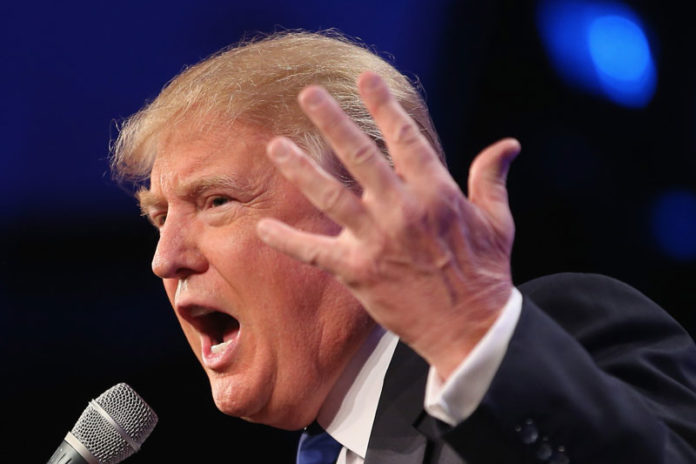With his polling numbers, Presidential Candidate Donald Trump appears to be a shoe in for the Republican nomination.
But the thought of Trump winning the nomination has GOP insiders apoplectic.
Last week, a story was leaked of a meeting of top RNC officials regarding their discussion of a brokered convention and the rules during a nomination free-for-all.
A brokered convention is a nomination process where the winner is not locked in with 51% of the vote. Delegates at the convention will be free to choose their candidate regardless of how the millions of voters swing in the primary elections.
The last brokered convention for the GOP was in 1976 where Gerald Ford arrived without enough delegate votes to win against his competitor Ronald Reagan.
Ford was the establishment candidate while Reagan was ironically despised by the establishment as a Washington outsider.
With maneuvering and the power of the establishment, Ford beat Reagan on the first round of votes.
As the convention date moves closer, it’s to the benefit of the Republican establishment to have as many candidates still in the race as possible.
With a split vote, it would be difficult for any candidate to take the necessary majority in convention– leading to a brokered convention where delegates are free to vote for any candidate.
Additionally, the Republicans have “Superdelegates” that are unpledged and allowed to vote for any candidate.
In 2016, 6.8% of votes for the nominee may be cast by Superdelegates.
Who are the Superdelegates? Unelected party insiders.
To make matters worse for Trump, states that hold their primary before or on Super Tuesday are required to allocate the vote for the nominee proportionally on the first ballot.
For instance, if Trump were to win the popular vote with 35% of the vote in South Carolina. Only 35% of delegates are required to vote for him. The remaining delegates would be required to vote proportionally for the other nominees.
This will leave Trump with a clear victory by percentage in the primaries, but without a majority required to win the nomination.
In a four-way+ race, it would be nearly statistically impossible for Trump to get 51% of the vote.
Additionally, given the near 7% advantage of party insiders, the GOP will be able to lock out Trump fairly easily.
A prediction of the convention gives Trump 34% of the vote – a 15-point lead over the closest competitor, but not enough to win the convention.
After the first round of votes, delegates are unleashed to vote for any candidate they choose, and we’ll see several other candidates drop in a scripted move to rally behind an establishment candidate.
On the second ballot, the RNC establishment wins and Trump loses.
Even Jeb Bush, who is only polling at 3% but is the choice of the establishment, could become the nominee.
While using procedural maneuvers and back room politics to oust Trump would be a bold move by the RNC, it’s the realistic move as they will not allow Trump to win.
Those thinking Trump can shift and run as an independent or third party candidate after losing the GOP nomination are incorrect.
Each state controls its own access to the ballot by setting its own rules. Many of those states such as Texas prohibit candidates who lost their primary from being on the general election ballot as an independent or third party candidate.
If Trump loses at convention, his name will not even be printed on many state ballots due to state laws. And seven states don’t even allow write-in candidates.
In the event the GOP thwarts the will of their grassroots party members to allow insider delegates to choose an establishment candidate, they will have to face the blowback of a nation.
Likely or not? Comment below.




























